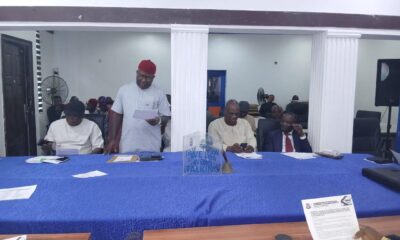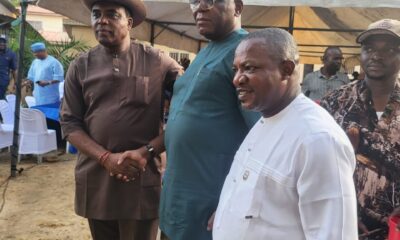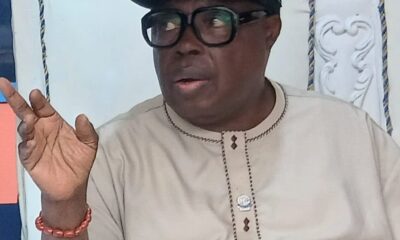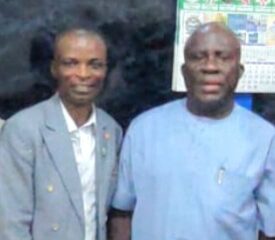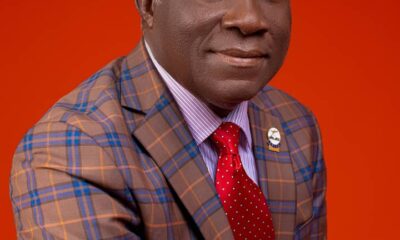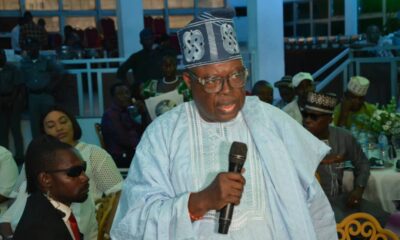Business Focus
ANLCA BoT 2024: ‘Demand for percentage commission is not out of place’ – Elochukwu

BY EGUONO ODJEGBA
The Association Of Nigeria Licensed Customs Agents (ANLCA) Group-of- 9 like-minds, contesting membership ticket of the Board of Trustees (BoT), penultimate week during its campaign revealed that the G9 plan to pursue the possibility of negotiating a percentage commission on customs revenue collected for government.
A member of the G9, Chief Ernest Elochukwu who revisited the proposal following an insider’s insinuation that the demand was misplaced and unrealistic, maintained that the proposal is legitimate and well informed; with the caveat that the idea of the G9 is also dependent on certain conditions, the group intend to pursue as a collective agenda.
“If the Institute of customs brokers is formed, it will be easier to get along that trajectory to demand for something”, Elochukwu said; dismissing the said objection as misplaced and egocentric.
Alhaji Taiwo Mustapha, the immediate past chairman, BoT and member of the G9 while speaking on the proposal earlier when he and some members of the G9 met with maritime journalists in Lagos, disclosed that the proposal may take the form of a short-medium-long-term proposal, which if elected the G9 composed BoT will initiate alongside other important businesses the board would push towards professionalizing and rebranding of ANLCA.
Examining the issue, he said whereas the proposal has become a definite decision, achieving it may take some time and efforts.
“Let me tell you, we know how difficult it will be because the people in the National Assembly that are supposed to make it into law are more interested in other issues. There is nobody who works for the federal government that does not receive commission. Whether it’s a contract, whether it’s supply services, even in teaching. In the customs books there is something called 1 percent CISS levy. We have sat down to think about this issue of one percent, but it is easier said than done.
“It is true that we want the one percent, but the CGC of customs cannot on his own, decide that he wants to start giving it to us. So part of our agenda is to it push through the National Assembly for it to be part of the law, it is achievable and if we kick-start it, even if we don’t achieve it in our time, another board can achieve it; but we want to kick-start the process.
“Today, we have a sitting Customs CG who listens to us, and this is a better time to kick-start it. For the eight years administration of the former Customs CG, Col Hameed Ali, even though we as agents never saw him in the day to day activities of our job, he did something that previous CGC’s were unable to achieve, he ensured that every Controllers of customs going on retirement is given a Toyota Corolla, a driver, and benefits. The ACG goes home with one car and one jeep, the DCG goes home with one jeep, one car and one pick-up truck, this is running till today.
“Ali was able to take it to the National Assembly and he achieved it. The benefits started from his tenure as CGC and didn’t cover those that preceded him. These benefits are renewable every four years until the officer dies. Any officer that doesn’t want to go with these packages can decide to trade it off and collect cash. It took Hameed Ali six years pursuing this in the National Assembly before he could get it done.

“So, if we are able to work with CGC Wale Adeniyi, no matter how long it takes us, I believe we would get it done. We are not asking for anything extraordinary, it is just one percent of whatever you are able to declare in a year”, Mustapha noted.
Speaking further on the proposal, Elochukwu faulted the dissenter on dismissing the idea as unrealistic, noting that it is doable and achievable.
“Individuals are free to always air their opinions about issues, after all that is what democracy entails. It depends however on the angle from which he looks at it. In the paper I presented on licensed customs agents during the concessioning in 2006 I ended up with a rhetorical question of ‘whose agent is he?’
“Perhaps part of the reasons we have had some of these issues we have as far as compliance is concerned is because the professionals involved in the execution of the import and export policies have not seen the need or the opportunity that is there if the government puts him ( agent) as the government agent. Just as you can talk about a licensed surveyor or auctioneer, these people protect the interest of the government even in the process of doing their duty because of the sensitive nature of their profession.
“I believe that if the licensed customs agent is also put on the same pedestal, he will go to the extent to being the eye of the government in whatever that is going on and bring a lot of sanity to the system. You can also tie this to the promise of the Group-of-nine like-minds BoT hopefuls to pursue the bill to establish a chartered institute of customs brokers if elected. These two are tied together.”
The former ANLCA national president also examined the issue of lumping strange bed fellows together in the nation’s freight industry and argued that until and unless customs brokers and freight forwarders and the other allied services are separated and properly guided, clarity of purpose, professionalism and compliance will remain a challenge.
“Because today, we go by the loose appellation- freight forwarder, you cannot really say that the freight forwarder is the professional because if freight forwarding includes those who are transporting goods and providing ancillary services in the cargo clearance process, it is not possible for you to bring all of them under customs brokerage because whatever we are talking about regarding the revenue collection percentage commission is about customs brokerage.
“If the Institute of Customs Brokers is formed, it will be easier to get along that trajectory to demand for something, that is, talking about our proposal to initiate a bill to seek percentage commission on revenue collected. The truth of it all again is that what is being proposed is not just like a bonus or dash to the customs brokers, it is like a payment that ensures their commitment to certain principles in doing whatever they are supposed to be doing to the government and that will augur well for the development of the practice, the government as well as the practitioner because that will give them a sense of ownership of the processes and the procedures.
“Don’t also forget that the primary declarants are the people that made the declaration and it is what they declare that is being worked on for customs to either accept or reject. And you know what it will mean if all the people that are going to make declarations will be acting in consonance with what the government will want it to be and that is where we are now talking about standardization and all that.
“It is all a composite issue, it is not separate or a windfall, it is something that is integral to the practice of customs licensed agents that is why I think the proposal can scale through alongside the chartering of the Institute of customs brokerage”, he enthused.

